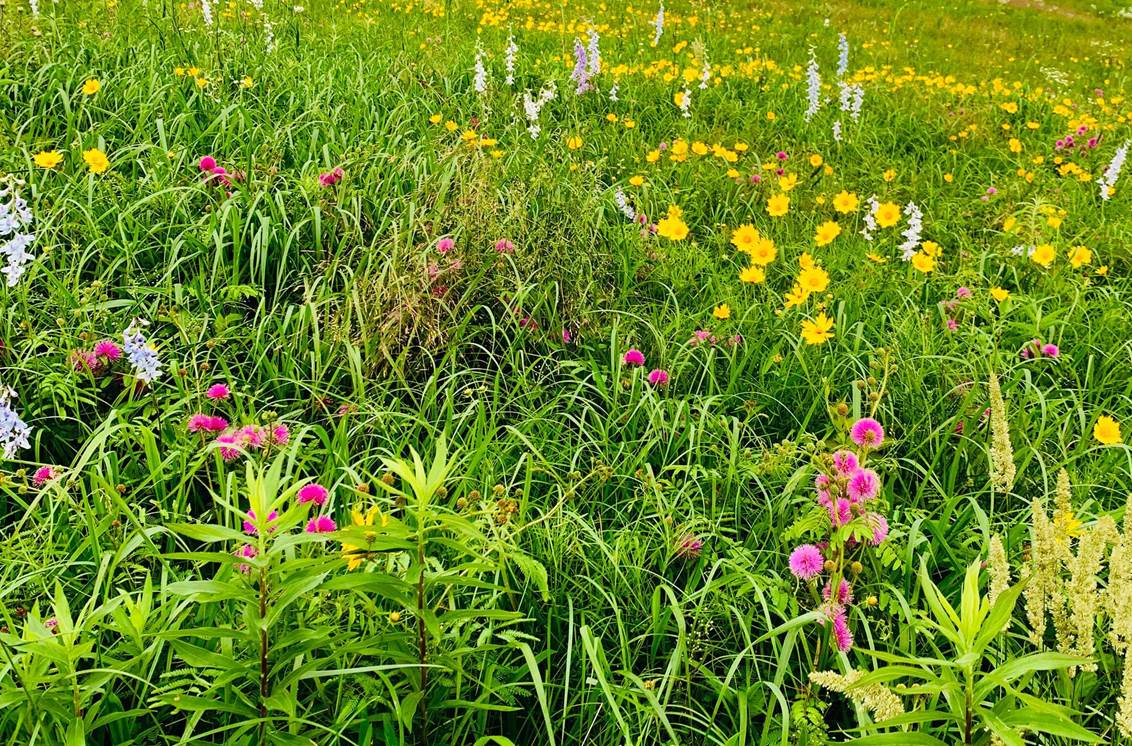- Create large “pollinator targets” of native or non-invasive plants.
- Use plants that provide nectar and pollen sources.
- Some plants may be harmful to pollinators such as Rhododendron and Azaleas – be sure to check before planting.
- Provide a water source, but include a few large stones to keep them from drowning.
- Place your garden in a sunny area with wind breaks.
- Plant large groupings of the same plant—called “pollinator targets”. They’re easier to spot from the air and easier to go from plant to plant in small areas.
- Keep plants that bloom throughout the growing season. This helps pollinators at each stage of their lives.
- Eliminate your use of pesticides.
- Pollinators like unkempt gardens – so delay the fall cleanup until spring!
What’s All the Buzz About Pollinators?
Liberty is committed to the sustainability of our communities. One initiative Liberty focuses on is pollinator health. Pollinators play an essential role in helping to increase food production, increase biodiversity, and supporting the overall health of our ecosystems.
Liberty supports pollinator gardens at numerous office locations across our service area. Many of these pollinator gardens are Monarch Waystation certified and the plants used are drought and heat tolerant, requiring less water to maintain.
In fact, Liberty’s efforts to protect wildlife and encourage pollinator health goes beyond gardens.
Relocating bee colonies
When it was found that bees had taken up residence in several meter boxes throughout the Cordes Lakes, Arizona, water service area, the operations team came to the rescue. Rather than exterminating them, we embraced the opportunity to support our stowaway pollinators. We called in Cricket, a professional beekeeper, to safely remove and relocate the bee colonies so Liberty’s meter reading and operations could resume and the bees could continue to flourish in a safer environment.
To help protect the Monarch butterfly, Liberty employees built a garden on a swamp located at their Massena, New York office. Employees planted milkweed, a plant with a milky sap that attracts butterflies, bees, moths, and a variety of other beneficial bugs. Each year, the team will be incorporating a new plant for other species looking for sustenance.
One employee also raises monarch caterpillars. She will nurture them at the office until they are full grown butterflies and then release them iinto he garden. Our hope is that this garden will make a lovely home to the species in danger of becoming extinct.
Two Georgia employees rolled up their sleeves recently to plant a pollinator garden at our Columbus facility. It has provided food and shelter for birds, bats, bees, butterflies and other insects and small mammals that keep plant life and crops growing all over the world.
Creating a thriving environment
Pollinators may be small, but they sure are mighty! These guys play a huge role in sustaining energy and water for life, so our team makes the most out of Liberty properties and right-of-ways to create environments where they can thrive.
Liberty's vegetation management team also restored a prairie near a substation in Joplin, Missouri. It used to require regular brush hogging, but restoration efforts created 10 acres of vibrant native plant species that require minimal maintenance. The high level of biodiversity makes the prairie an excellent training tool for our crews to sharpen their plant ID skills, which is very helpful for safety and efficiency as they tend to vegetation surrounding our infrastructure.
The team later added beehives to the prairie to enrich our pollinator program. Through these efforts, they've grown their knowledge of managing vegetation without harming pollinators. Their experience caring for the bees also helps them communicate and better understand the needs of local customers who are beekeepers.


